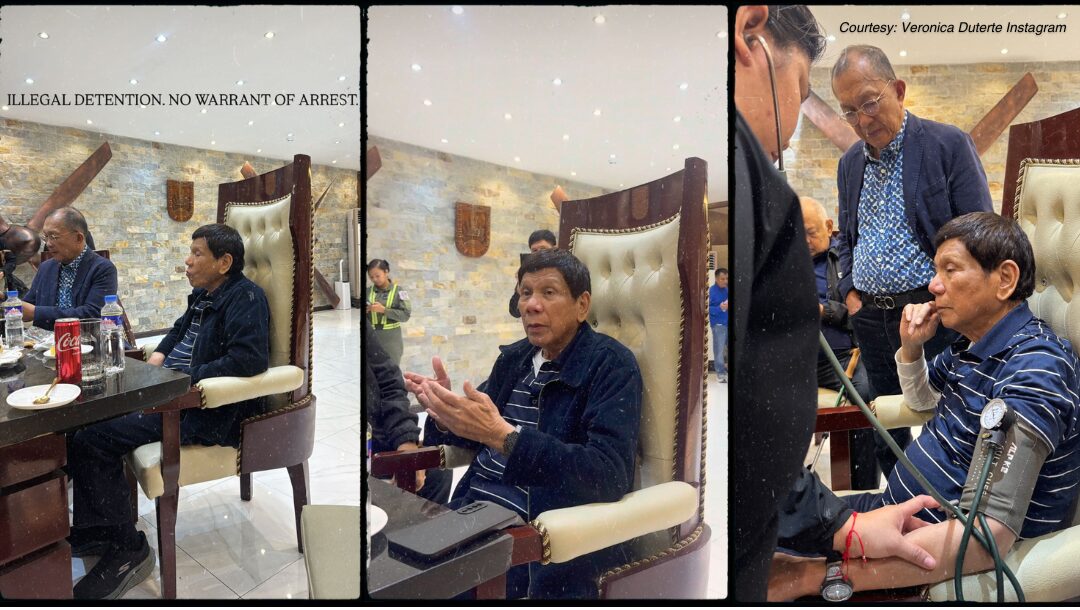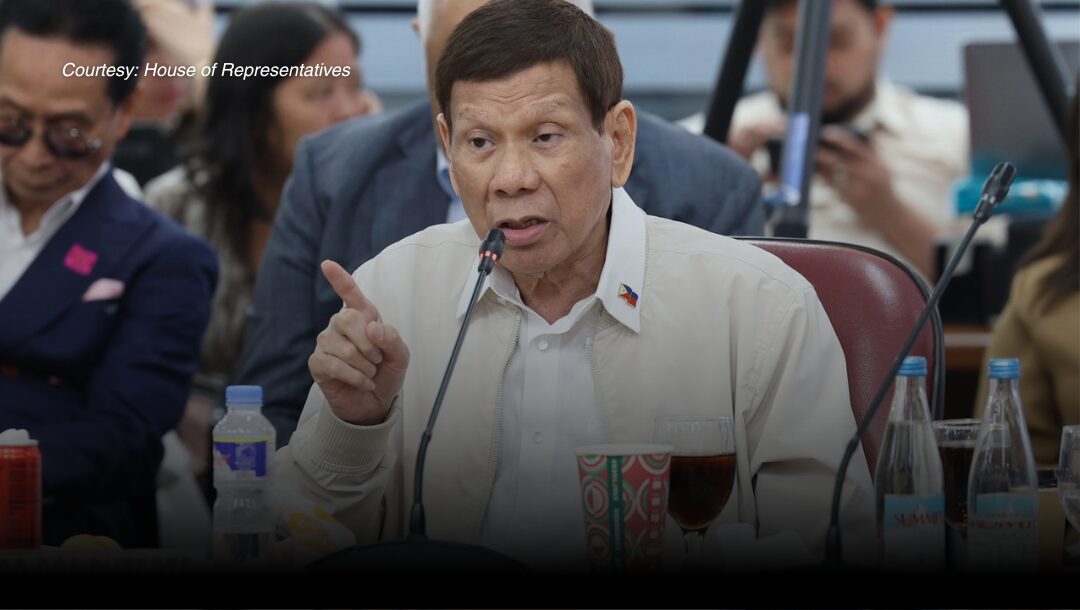UPDATE:
As of 1 p.m., March 12, the chartered plane carrying former president Rodrigo Duterte was expected to arrive in Rotterdam, Netherlands at 6 p.m. (Manila time).
Duterte left the Philippines 11:03 p.m., March 11.
March 11 9:30 p.m., Duterte was on a chartered plane at the Ninoy Aquino International Airport that would take him to The Hague, Netherlands, headquarters of the International Criminal Court.
He was accompanied by former executive secretary Salvador Medialdea.
***
The Philippine government has the option to speed up the turnover of former president Rodrigo Duterte to the International Criminal Court (ICC) in The Hague following his arrest on Tuesday upon arrival from Hong Kong.
Lawyer Joel Butuyan, who is representing drug war victims, cited Republic Act No. 9851, which provides under Section 17 that Philippine authorities “may dispense with the investigation or prosecution” of a crime punishable under the law “if another court or international tribunal is already conducting the investigation or undertaking the prosecution” of crimes defined in the law.
RA 9851, also known as the “Philippine Act on Crimes Against International Humanitarian Law, Genocide, and Other Crimes Against Humanity,” further provides that local authorities “may surrender or extradite” suspected or accused persons in the Philippines to the “appropriate international court, if any, or to another State pursuant to the applicable extradition laws and treaties.”
Butuyan is one of five Filipino lawyers accredited as counsels in the ICC.

Duterte was detained at the Villamor Air Base in Pasay City after his arrest upon his arrival from Hong Kong before noon on March 11. The Philippine National Police (PNP) served the warrant from the ICC, coursed through the International Police (Interpol) for alleged crimes against humanity over his deadly “war on drugs.”
PNP-Criminal Investigation and Detection Group (CIDG) chief Major General Nicolas Torre III read the Miranda doctrine to Duterte as well as the accusations levelled against him.
Under RA 9851, the Philippine government can hand over Duterte directly to the ICC if any one of the following conditions is met:
(a) The accused is a Filipino citizen
(b) The accused, regardless of citizenship or residence, is present in the Philippines, or
(c) The accused has committed the said crime against a Filipino citizen.
“This will expedite matters and minimize political unrest that can be fomented by Duterte supporters,” Butuyan explained.
When Duterte is brought to The Hague, and pending trial, he can apply for an interim release under stricter measures. If the Pre-Trial Chamber is satisfied that Duterte’s continued arrest is necessary, then the former president will still be detained.
Butuyan explained that while the Marcos administration can pursue two ways to surrender Duterte to the ICC, Duterte has the right to apply for an interim release while in the Philippines and in The Hague.
The ICC’s Pre-Trial Chamber I said in the arrest order that:
“…Mr Duterte, even though no longer the President of the Philippines, appears to continue to wield considerable power. Mindful of the resultant risk of interference with the investigations and the security of witnesses and victims, the Chamber is satisfied that the arrest of Mr Duterte is necessary within the meaning of article 58(1)(b)(i) of the Statute to ensure his appearance before the Court.”
Source: ICC arrest warrant for Rodrigo Duterte, page 13
If the Marcos administration follows the Rome Statute by the book, Duterte can apply for a temporary release after a Philippine regional trial court determines that (1) the warrant issued against Duterte applies to him, (2) he was arrested following the proper process, and (3) his rights were respected.
However, Duterte needs to show the court that he has “urgent and exceptional circumstances” that require his temporary release from custody in the country.
“The second question is whether there are necessary safeguards to ensure that the Philippines can fulfill its duty to surrender. So, the local court will have to satisfy those two grounds before it grants an interim release,” Butuyan said.
Butuyan pointed out that claims on Duterte’s health have to be substantiated with medical records.
“It will not just come from the doctor of Mr. Duterte. There will have to be independent doctors who will make the evaluation,” the lawyer said, adding that Duterte’s trip to Hong Kong, where he spoke at a gathering of Filipino migrant workers, is “very damaging evidence” against any motion for his interim release.
There is no specific period for the Marcos administration to complete the arrest proceedings . However, Butuyan said: “It has to be prompt. It cannot be like six months from now.”
More arrest orders forthcoming?
Salvador Panelo, Duterte’s chief legal counsel when he was president, described the former president’s arrest “unlawful.” While protesting that he was not allowed to get near Duterte at Villamor, Panelo questioned the validity of the warrant, saying the PNP did not have a hard copy and deprived the former president his right to meet his lawyers upon arrival at the airport.
Former executive secretary Salvador Medialdea similarly questioned the former president’s arrest, reiterating that the Philippines is no longer under ICC’s jurisdiction.
Butuyan believes these arguments will be echoed both before Philippine courts and in the ICC, when Duterte gets there.
(Read VERA FILES FACT CHECK YEARENDER: The Phantom of Duterte’s Disinformation Opera)
“But we already have two courts [Supreme Court and the ICC] which both affirm the jurisdiction of the ICC for crimes committed during the time that the Philippines was still a state party to the Rome Statute,” the lawyer pointed out.
Butuyan said he believes more warrants of arrest are forthcoming for other personalities involved in the ICC’s probe of crimes committed in the course of Duterte’s bloody drug war from Nov. 1, 2011 to March 16, 2019, when the Philippines was still a member of the Rome Statute.
In 2023, VERA Files reported that Vice President Sara Duterte and Sens. Christopher Lawrence “Bong” Go and Ronald “Bato” Dela Rosa were mentioned in documents submitted to the ICC.
(Read VP Sara, 2 senators named in ICC probe documents)
“There is a phrase there (arrest warrant) which says, ‘[Duterte] together with his co-perpetrators…’ So, there’s an indication that there’s going to be a forthcoming second or probably even third warrant of arrest,” Butuyan explained. “Besides, Mr. Duterte is designated here as an indirect participant, so, we anticipate that there are going to be direct participants who are going to be charged as well.”
Three former ranking PNP officers – Major General Romeo Caramat Jr., former chief of the CIDG; retired colonel Edilberto Leonardo, former commissioner of the National Police Commission; Brig. Gen. Eleazar Matta, former PNP chief intelligence officer – were included in the ICC investigation’s list of suspects, together with Dela Rosa and former PNP chief Oscar Albayalde, in a four-page confidential document dated July 3.
The document was sent through the Philippine Embassy in The Hague and released to the media on July 25 by former senator Antonio Trillanes IV, one of the earliest complainants to the ICC against Duterte’s brutal drug war.


